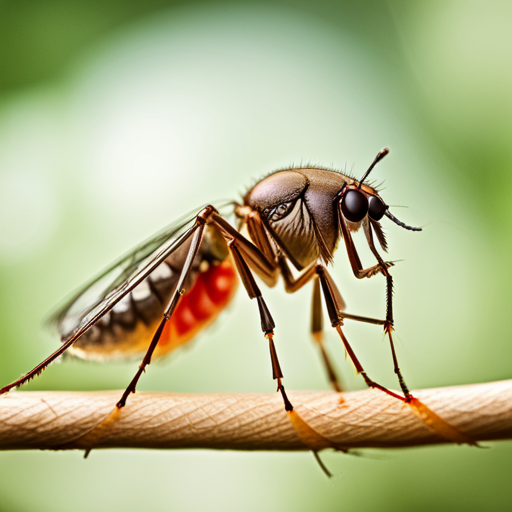Ticks are small, parasitic arthropods that feed on the blood of animals and humans. They can transmit serious diseases such as Lyme disease, Rocky Mountain spotted fever, and tularemia. As such, it is important to take steps to repel them from your yard and body.
There are a number of commercial tick repellants available on the market. Most are made with Deet, a synthetic chemical compound used to repel insects. It works by masking scents that attract ticks, and it can be found in lotions, sprays, and wipes. However, Deet should not be used on children under the age of two months or pets due to the risk of toxicity.
In addition to chemical repellants, there are also natural products that can be used for tick prevention. Products containing essential oils such as lavender, peppermint, and eucalyptus are popular choices. These oils may help mask scents that ticks use to find hosts and are generally considered safe when used correctly. However, they must be reapplied more often than chemical repellants, and some people may experience skin irritation when using them.
Another natural option is to create a homemade tick repellant out of garlic powder or vinegar. Sprinkling garlic powder around the perimeter of your yard can help deter ticks from entering. As for vinegar, applying it directly to the skin is believed to be effective in keeping ticks away. Though there isn’t any scientific evidence to back up these claims, many people have found success with using garlic powder and vinegar.
Finally, certain plants can also help keep ticks away. Planting marigolds around the perimeter of your yard may help repel ticks. Citronella and lavender are also known to have repellent properties, so planting these near potential tick entry points in your yard could help reduce their presence.
Overall, there are a variety of different methods you can use to help repel ticks. Depending on your preferences, you might want to opt for natural remedies such as plants or essential oils, or you may prefer to use more traditional treatments like insecticides. Whichever option you choose, taking the proper precautions can help keep ticks away from your property.
Remember, when dealing with ticks it’s important to take extra precaution and always consult a doctor if you are bitten by one. While using these repellants can help reduce the likelihood of being bitten, it’s not a guarantee that you will be completely safe. By staying informed and taking the right preventative measures, you can help keep yourself and your family safe from ticks.
The key to successfully repelling ticks is to take the necessary precautions and be aware of your surroundings. Remember to check for ticks frequently, wear the right clothing, and utilize tick repellants appropriately. By doing so, you can help reduce your chances of getting bitten by ticks and make sure that your family stays safe.
If you have any further questions about tick repellents or controlling ticks in general, consult a professional. With the right information and guidance, you can protect yourself from ticks and other pests so that you and your family can enjoy outdoor activities without worrying about tick bites.
Tick repellants are an important part of controlling the spread of disease-carrying ticks in your area. By staying informed and taking proper precautions, you can protect yourself and your family from tick-borne illnesses.
To summarize, tick repellants are an important way to reduce the chances of getting bitten by ticks. They should be used in combination with other measures such as wearing protective clothing, avoiding dense vegetation, checking for ticks after outdoor activities, and consulting a professional if necessary. Various types of repellants are available, including sprays, lotions, and granular products. It is important to read the label carefully and follow the directions for safe use. With careful research and application, you can protect yourself from tick bites and enjoy outdoor activities without worry.
Sprays are the most common form of tick repellant, and they typically contain DEET or permethrin. DEET is effective against ticks, but it can cause skin irritation in some people. Since DEET can also be toxic if ingested, it should not be applied to children’s faces or hands. Permethrin is a synthetic form of pyrethrin, a compound derived from chrysanthemums. It is highly effective against ticks and other insects but can cause serious reactions in cats and should not be used on them.
Lotions are another common form of tick repellent, usually containing DEET or permethrin. They are less likely to cause skin irritation than sprays and are effective for several hours. Natural repellents containing lemon eucalyptus oil or citronella oil can be used as well, but they may not provide the same protection from ticks as DEET or permethrin.
Wearing long sleeves and pants when outdoors can also help keep ticks away. Tucking pant legs into socks and taping cuffs can further reduce the risk of tick bites. Light colors are also beneficial as they make ticks more visible and easier to remove if they do latch on.
Finally, checking for ticks after spending time outdoors is essential in preventing tick-borne illnesses. It’s important to note that ticks often attach in out-of-the-way places, such as the armpits, groin, or scalp. If a tick is found, it should be removed as soon as possible to reduce the risk of disease transmission. The Centers for Disease Control and Prevention (CDC) recommends using tweezers to firmly grasp and remove the tick close to the skin. After removal, it’s important to clean the area with soap and water or rubbing alcohol. Finally, it is best to dispose of a tick by putting it in alcohol or flushing it down the toilet.
By applying these strategies, people can dramatically reduce their risk of getting bitten by ticks and prevent contracting serious illnesses. Aside from practicing good personal hygiene, there are a number of other strategies that can be used to help reduce tick exposure.
Peppermint Oil
Peppermint oil is an effective tick repellant because of its strong aroma. The scent of peppermint oil repels ticks by masking the odors that attract them in the first place. In addition, peppermint oil is a natural insecticide and has been found to be very effective at killing ticks on contact.
To use peppermint oil as a tick repellant, it needs to be diluted in water or other carrier oils and applied directly to the skin. This should be done carefully, avoiding contact with eyes and mouth. It is important not to apply too much peppermint oil, as this can cause irritation or even an allergic reaction. When using on children or pets, it is best to consult a doctor or veterinarian first.
The effects of peppermint oil as a tick repellent can last for several hours, but reapplication may be necessary depending on the length and intensity of outdoor activities. To get the most out of its effect, it is recommended to apply the diluted peppermint oil mixture to the skin prior to going outdoors, and then apply it as often as needed.
So why does peppermint oil work so well? According to studies, the menthol contained in peppermint has been found to be a natural insect repellent. In particular, ticks have an aversion to this scent, which is why it is used as a repellent.
Also, the smell of peppermint oil is not as strong as many other chemical tick repellents, so it can be used in areas where chemical sprays are not allowed. Additionally, because it does not contain any harsh or unnatural chemicals, it is much safer for humans and animals to use than chemical insecticides.
Finally, peppermint oil is relatively inexpensive and easy to obtain. You can find it in health food stores or online, and it can be used both indoors and outdoors. Its convenience makes it an ideal choice for those looking for a natural way to repel ticks without using harsh chemicals.
Peppermint oil is an effective, affordable, and safe way to repel ticks. It is a natural alternative for those who want to avoid using chemical insecticides in their home or yard. With its pleasant scent and ease of application, it can be an excellent choice for protecting your family from dangerous tick bites.


